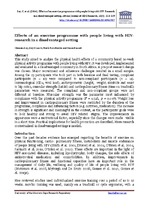Effects of an exercise programme with people living with HIV: Research in a disadvantaged setting
Date
2014Author
Ley, Clemens
Leach, Lloyd
Barrio, María Rato
Bassett, Susan
Metadata
Show full item recordAbstract
This study aimed to analyse the physical health effects of a community based 10-week physical activity programme with people living with HIV. It was developed, implemented and evaluated in a disadvantaged community in South Africa. A pre-post research design was chosen. Major recruitment and adherence challenges resulted in a small sample. Among the 23 participants who took part in both baseline and final testing, compliant participants (n = 12) were compared to non-compliant participants (n = 11). Immunological (CD4, viral load), anthropometric (height, weight, skinfolds and waist to hip ratio), muscular strength (h1RM) and cardiopulmonary fitness (time on treadmill) parameters were measured. The compliant and non-compliant groups were not different at baseline. Muscular strength was the parameter most influenced by compliance with the physical activity programme (F = 4.516, p = 0.047). Weight loss and improvement in cardiopulmonary fitness were restricted by the duration of the programme, compliance and influencing factors (e.g. nutrition, medication). The increase in strength is significant and meaningful in the context, as the participants goals were to look healthy and strong to avoid HIV related stigma. The improvements in appearance were a motivational factor, especially since the changes were made visible in a short time. Practical implications for health promotion are described. More research contextualised in disadvantaged settings is needed.

